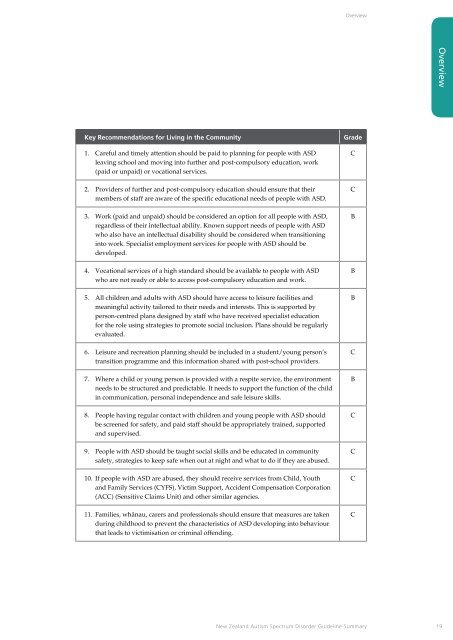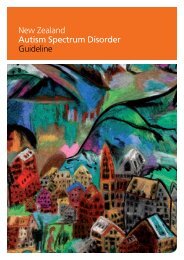New Zealand Autism Spectrum Disorder ... - Ministry of Health
New Zealand Autism Spectrum Disorder ... - Ministry of Health
New Zealand Autism Spectrum Disorder ... - Ministry of Health
Create successful ePaper yourself
Turn your PDF publications into a flip-book with our unique Google optimized e-Paper software.
Overview<br />
Overview<br />
Key Recommendations for Living in the Community<br />
1. Careful and timely attention should be paid to planning for people with ASD<br />
leaving school and moving into further and post-compulsory education, work<br />
(paid or unpaid) or vocational services.<br />
2. Providers <strong>of</strong> further and post-compulsory education should ensure that their<br />
members <strong>of</strong> staff are aware <strong>of</strong> the specific educational needs <strong>of</strong> people with ASD.<br />
3. Work (paid and unpaid) should be considered an option for all people with ASD,<br />
regardless <strong>of</strong> their intellectual ability. Known support needs <strong>of</strong> people with ASD<br />
who also have an intellectual disability should be considered when transitioning<br />
into work. Specialist employment services for people with ASD should be<br />
developed.<br />
4. Vocational services <strong>of</strong> a high standard should be available to people with ASD<br />
who are not ready or able to access post-compulsory education and work.<br />
5. All children and adults with ASD should have access to leisure facilities and<br />
meaningful activity tailored to their needs and interests. This is supported by<br />
person-centred plans designed by staff who have received specialist education<br />
for the role using strategies to promote social inclusion. Plans should be regularly<br />
evaluated.<br />
6. Leisure and recreation planning should be included in a student/young person’s<br />
transition programme and this information shared with post-school providers.<br />
7. Where a child or young person is provided with a respite service, the environment<br />
needs to be structured and predictable. It needs to support the function <strong>of</strong> the child<br />
in communication, personal independence and safe leisure skills.<br />
8. People having regular contact with children and young people with ASD should<br />
be screened for safety, and paid staff should be appropriately trained, supported<br />
and supervised.<br />
9. People with ASD should be taught social skills and be educated in community<br />
safety, strategies to keep safe when out at night and what to do if they are abused.<br />
10. If people with ASD are abused, they should receive services from Child, Youth<br />
and Family Services (CYFS), Victim Support, Accident Compensation Corporation<br />
(ACC) (Sensitive Claims Unit) and other similar agencies.<br />
11. Families, whänau, carers and pr<strong>of</strong>essionals should ensure that measures are taken<br />
during childhood to prevent the characteristics <strong>of</strong> ASD developing into behaviour<br />
that leads to victimisation or criminal <strong>of</strong>fending.<br />
Grade<br />
C<br />
C<br />
B<br />
B<br />
B<br />
C<br />
B<br />
C<br />
C<br />
C<br />
C<br />
<strong>New</strong> <strong>Zealand</strong> <strong>Autism</strong> <strong>Spectrum</strong> <strong>Disorder</strong> Guideline Summary 19











